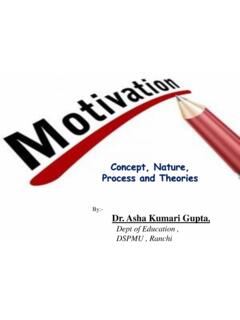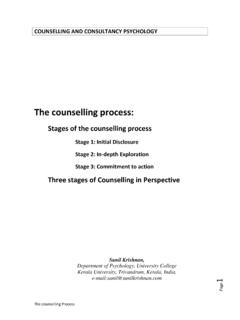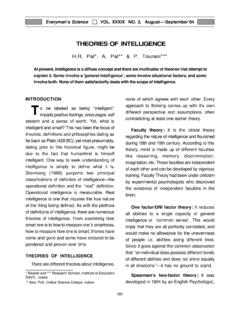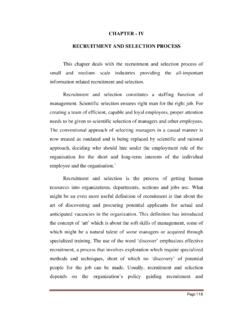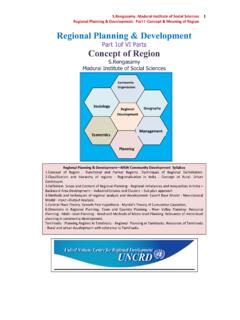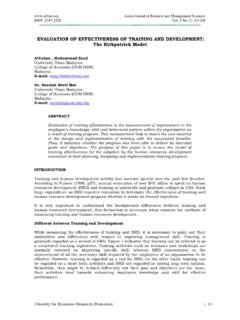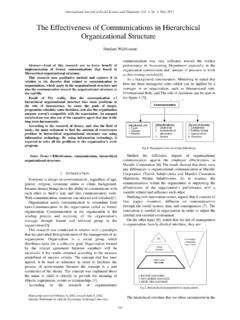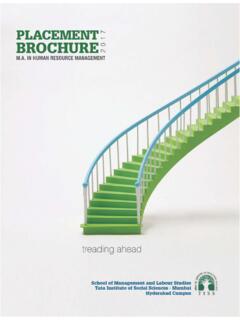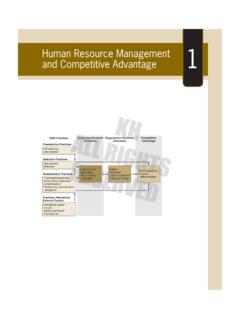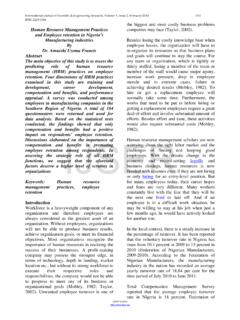Transcription of CHAPTER 3- CONCEPT OF TRAINING
1 33 CHAPTER 3- CONCEPT OF TRAINING 34 TRAINING & DEVELOPMENT The essence of teaching is to make learning contagious, to have one idea spark another. ~ Marva Collins INTRODUCTION TRAINING and development describes the formal, ongoing efforts that are made within organizations to improve the performance and self-fulfillment of their employees through a variety of educational methods and programmes. In the modern workplace, these efforts have taken on a broad range of applications from instruction in highly specific job skills to long-term professional development. In recent years, TRAINING and development has emerged as a formal business function, an integral element of strategy, and a recognized profession with distinct theories and methodologies.
2 More and more companies of all sizes have embraced "continual learning" and other aspects of TRAINING and development as a means of promoting employee growth and acquiring a highly skilled work force. In fact, the quality of employees and the continual improvement of their skills and productivity through TRAINING are now widely recognized as vital factors in ensuring the long-term success and profitability of small businesses. "Create a corporate culture that supports continual learning," counseled Charlene Marmer Solomon15 in Workforce. "Employees today must have access to continual TRAINING of all types just to keep If you don't actively stride against the momentum of skills deficiency, you lose ground. If your workers stand still, your firm will lose the competency race.
3 " PHILOSOPHY OF TRAINING According to S Chandra16, management of the organization firmly believes that human assets unlike other asset cannot be depreciated and must necessarily be appreciated over entire tenure. Therefore TRAINING is regarded as investment and not a cost. Even long-term intangible gains such as attitude change, are to be considered as valuable returns. TRAINING is considered as vehicle for effective communication and coordination. TRAINING is catalytic in any man management matrix for cohesiveness, compatibility, and cooperation in every organizational endeavour. 35 management proclaims TRAINING & Development direction as permanent part & parcel of operational process and not some experiment in isolation.
4 management is fully committed to lend its total support to TRAINING tasks and is dedicated through intense involvement in every phase of this activity. CONCEPT OF TRAINING It is about developing employees as an individual to make them capable and confident in their jobs, and consequently in their life. Thus it is an organized process for increasing the knowledge and skill of the employees. Consequently it is a process aimed at changing the behavior in such a way that the consequence would be useful for the upliftment of the organization. According to Wayne F Cascio17, TRAINING consists of planned programme designed to improve performance at the individual, group, and /or organizational levels. Improved performance, in turn, implies that there have been measurable changes in knowledge, skills attitude, and/or social behavior.
5 TRAINING is considered as a tool for HRD. TRAINING has immense potential in transfer and utilization of latest technical know-how, leadership development, organization of people, formation of self-help-groups, mobilization of people as well as resources, empowerment of resource -poor rural mass, entrepreneurship development, etc., which are considered essential components of HRD. According to C B Memoria, TRAINING is a process of learning a sequence of programmed behavior. It is application of knowledge and it attempts to improve the performance of employee on the current job and prepares them for the intended job. TRAINING is a short term process utilizing a systematic and organized procedure by which non managerial personnel acquire technical knowledge and skills for a definite purpose.
6 TRAINING refers to instructions in technical and mechanical operations, like operation of some machine/equipment. TRAINING is for a specific job related purpose 18 36 TRAINING is about developing people as an individual and helping them to become more confident and competent in their lives and in their jobs. The learning process is at the core of TRAINING and the ways of and opportunities for learning are numerous and varied. CONCEPT OF DEVELOPMENT Development is related to enhancing the conceptual skills of the employee, which helps individual towards achieving maturity and self actualization. In the words of Michael Armstrong19 Employee development, often referred to as human resource development (HRD) is about the provision of learning, development and TRAINING opportunities in order to improve individual, team and organizational performance.
7 Development is defined by Alan Mumford 20 as an attempt to improve managerial effectiveness through a planned and deliberate learning process. According to Bernard M Bass & James A. Vaughan21 Development implies the nature and change induced among employees through process of education and TRAINING . In the words of Harold Koontz and Cyril O. Donnel Managerial development concerns the means by which a person cultivates those skills whose application will improve the efficiency and effectiveness with which the anticipated results of a particular organizational segment are achieved. In the field of human resource management , TRAINING and development is the field concerned with organizational activity aimed at bettering the performance of individuals and groups in organizational settings.
8 It has been known by several names, including employee development, human resource development and learning and development. Rosemary Harrison 22 DISTINCTION BETWEEN TRAINING & DEVELOPMENT According to Yoder23 although the terms TRAINING and development appear synonymous, there is recognized difference between these concepts. Earlier TRAINING programmes stressed preparation for an improved performance in largely specific rank and file jobs. With growth of organizations several problems developed specifically at supervisory level. Accordingly supervisory TRAINING programmes were launched enabling them to deal with distinctive problems. During the TRAINING of the supervisors, the need for 37 TRAINING of their bosses appeared significant.
9 Therefore, special developmental programmes for middle managers were organized. Later on, the development programmes were started for top management as well. These programmes indicated the significance of the CONCEPT of development, and thus TRAINING appeared to be an improper designation for learning a wide variety of complex, difficult and intangible functions of managerial personnel. Thus the CONCEPT TRAINING was degraded. As managers themselves remarked TRAINING is for dogs, people are developed . Today, the terms development and education are more suitable than the term TRAINING . It is not the TRAINING but the full development of personality that enables the human resources to exert their full potential. Accordingly TRAINING and development programmes are combined together for developing skills as well as basic attitudes, leading to continued personal growth.
10 Distinction between TRAINING & Development TRAINING Development Vocationally oriented and on the job and so it is short term A long term process for developing conceptual skills It is generally for non managerial personnel It is generally for managerial personnel It is imparting of technical and mechanical knowledge It is theoretical and conceptual idea implementation. It is related with specific job It is aimed at acquiring general knowledge A mechanic who repairs generator better than engineer is only trained An engineer may not be better mechanic but he has theoretical and conceptual skill as well as knowledge of principles of engineering Another distinction can be understood from the term four Ws. Who is learning?
